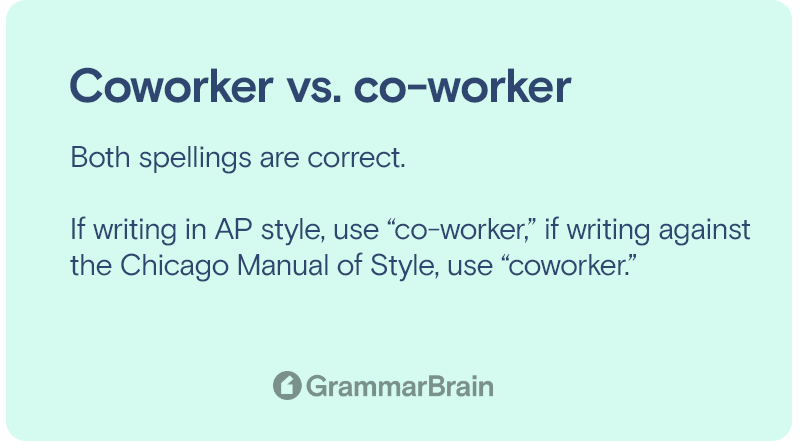Is it “coworker” or “co-worker?” English is full of annoying small quirks that can make learning and using it difficult at times. Long, intricate terms aren’t an issue as long as there’s a clear response regarding how they’re spelled. Dealing with nouns that have several proper spellings—like when adhering to a specific style guideline. This is true of coworker and co-worker.
If you like, you may hyphenate this compound word or write it as a single, unhyphenated word. In both circumstances, your spelling might be considered correct by some and erroneous by others.

Is it “coworker” or “co-worker?”
Coworker or co-worker, whatever way you choose to you spell it, is a noun that always signifies the same thing. A coworker generally works the same job and at the same position in the organizational hierarchy.
However, while you may be very certain that you will be understood whether you hyphenate or not, there are times when merely being understood is insufficient. If you need to submit a paper for university or an article for the newspaper, you must write in the anticipated style.
For example, if your publication or university adheres to the AP Stylebook, you must employ the hyphen—the AP prefers “co-worker.” If you followed the 16th edition of the Chicago Manual of Style, it would be better to write “coworker.“
If you use the Oxford Dictionary as your guide, you must hyphenate while writing in British English and not in American English. If you’re referring to Merriam-Webster as a reference, you’d solely use the unhyphenated version.
| Spelling | Rule |
| Co-worker | AP Style |
| Coworker | 16th Edition of Chicago Manual of Style |
| Coworker/Co-worker | American English/UK English |
How to decide between “co-worker” and “coworker”
You are free to use either co-worker or coworker as you see appropriate, as it is unlikely to make a significant impact.
If neither co-worker nor coworker appeals to you, we propose that you use the hyphenated word, co-worker. As some authors frequently hyphenate prefixes when they believe a term will be confusing without any of the punctuation.
Some readers may misinterpret the term coworker as starting with the term cow. Choosing a coworker or co-worker for your writing is seldom a matter of “correct” or “wrong” spelling or wording.
Rather, your decision will be influenced by your personal style of writing in addition to your understanding of readers.
Examples of “co-workers” and “coworkers” in sentences
- Daniel showed his co-workers some images of his new bungalow.
- All my coworkers consistently fail to complete the given tasks at home.
- Dating a coworker can be helpful. When I talk about my work outside of the office, I don’t need to tell him anything because my partner already knows everything.
Conclusion
In summary, both spellings are valid. Although the unhyphenated coworker tends to be picking up steam, both spellings are often used.
However, regardless of what spelling you pick, a certain number of individuals will assume it’s misspelt. In my opinion, you should go with your company or organization style if one exists.
Use “coworker” if you follow AP Style.
Use a “co-worker” (with a hyphen) if you’re publishing and follow Chicago Style.
If no grammar rules exist where you’re writing, or if you are a nameless author in need of assistance, use the hyphenated co-worker.
The spelling “co-worker” appears to be the one most commonly employed in edited, authorized text.
Inside this article
Fact checked:
Content is rigorously reviewed by a team of qualified and experienced fact checkers. Fact checkers review articles for factual accuracy, relevance, and timeliness. Learn more.
Core lessons
Glossary
- Abstract Noun
- Accusative Case
- Anecdote
- Antonym
- Active Sentence
- Adverb
- Adjective
- Allegory
- Alliteration
- Adjective Clause
- Adjective Phrase
- Ampersand
- Anastrophe
- Adverbial Clause
- Appositive Phrase
- Clause
- Compound Adjective
- Complex Sentence
- Compound Words
- Compound Predicate
- Common Noun
- Comparative Adjective
- Comparative and Superlative
- Compound Noun
- Compound Subject
- Compound Sentence
- Copular Verb
- Collective Noun
- Colloquialism
- Conciseness
- Consonance
- Conditional
- Concrete Noun
- Conjunction
- Conjugation
- Conditional Sentence
- Comma Splice
- Correlative Conjunction
- Coordinating Conjunction
- Coordinate Adjective
- Cumulative Adjective
- Dative Case
- Determiner
- Declarative Sentence
- Declarative Statement
- Direct Object Pronoun
- Direct Object
- Diction
- Diphthong
- Dangling Modifier
- Demonstrative Pronoun
- Demonstrative Adjective
- Direct Characterization
- Definite Article
- Doublespeak
- False Dilemma Fallacy
- Future Perfect Progressive
- Future Simple
- Future Perfect Continuous
- Future Perfect
- First Conditional
- Irregular Adjective
- Irregular Verb
- Imperative Sentence
- Indefinite Article
- Intransitive Verb
- Introductory Phrase
- Indefinite Pronoun
- Indirect Characterization
- Interrogative Sentence
- Intensive Pronoun
- Inanimate Object
- Indefinite Tense
- Infinitive Phrase
- Interjection
- Intensifier
- Infinitive
- Indicative Mood
- Participle
- Parallelism
- Prepositional Phrase
- Past Simple Tense
- Past Continuous Tense
- Past Perfect Tense
- Past Progressive Tense
- Present Simple Tense
- Present Perfect Tense
- Personal Pronoun
- Personification
- Persuasive Writing
- Parallel Structure
- Phrasal Verb
- Predicate Adjective
- Predicate Nominative
- Phonetic Language
- Plural Noun
- Punctuation
- Punctuation Marks
- Preposition
- Preposition of Place
- Parts of Speech
- Possessive Adjective
- Possessive Determiner
- Possessive Case
- Possessive Noun
- Proper Adjective
- Proper Noun
- Present Participle
- Prefix
- Predicate



